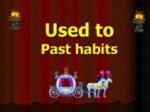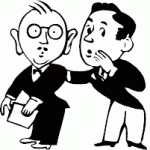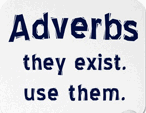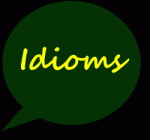|
|

The (-ed) ending of regular past forms has three sound realizations: [-d] [-t] [-id], depending on the sounds just before it.
• If the verb ends in a voiced phoneme, the ‘-ed’ ending sounds like [-d]
• If the verb ends in a voiceless consonant […]

•→ QUIZ ⇐

¤ Past simple for past habits & states :
The past simple is used to express habits and states that existed during a period of time in the past. This period can be implied or expressed with a time expression or a clause:
When I was a child, I visited my grandma every […]

♣ Negation ⇐(like asking) is one of the most difficult areas of English
•→ Double Negatives⇐[a feature of Spaniards and Blacks]
∇ Transferred Negation
When we express negative ideas with verbs like think, believe… we prefer to make the first verb negative instead of the second. We shift or transfer the […]

• Asking questions is another tricky area of English language. This →Anglo-link video lesson ←may give you some insights.
⇓ Another video tutorial by Katie [Beta College of English]
◊→ Intonation in questions ⇓
•→ Question Tags – Intonation ←
•→ Follow-up Questions ⇐
[…]

¤ Ways of saying . . . ‘YEP!’ ⇓
. . . ‘definitely‘ / ‘of course‘ / ‘sure‘ / ‘naturally‘ / ‘that’s right‘ / ‘I don’t mind if I do‘ / ‘by all means‘ / ‘you bet‘ / ‘you’re on‘ / ‘no problem‘ / ‘affirmative‘ / ‘absolutely‘ […]

♣ English Tenses & Aspects . . . →[Basic]← // →[Advanced]←
English tenses ⇑ ∞ Tense consistency …
Many learners get mixed up between these two expressions. Listen to Liliane’s free tutorial at Beta College of English ⇓
What’s important to remember: the forms ‘have/has got..’ are only […]

English has several forms which express future events. The form we choose depends on how sure we are that something will happen, whether we want something to happen, or whether we are talking about ourselves or others. ASPECT is much more important than TIME.
⇒Predictions/Statements of fact/Intentions/Arrangements/Scheduled events⇐
[…]

¤ ACTIVE & PASSIVE TENSES CHART… ⇒ [01] ⇔ [02] ⇐
We find an overabundance of the passive voice in sentences created by self-protective business interests, magniloquent educators, and bombastic military writers (who must get weary of this accusation), who use the passive voice to avoid responsibility for actions taken.
Thus «Cigarette ads were […]

Determiners are grammar words which come in front of nouns.
•→https://eslgrammar.org/determiner/⇐
Click icon to open a chart with the correct collocations of such words →
Pay attention to the kinds of nouns they go with: countable (singular? plural?) or uncountable?
∞ Quantifiers: ⇓ (a) few, (a) little…
•→Quantifiers: fill in the gaps⇐
•→Determiners […]

∴
A →quantifier ← is a type of determiner, such as all or many, that indicates quantity.
These items have been argued to correspond to logical quantifiers at the semantic level.
Some Notes on Quantifiers ⇓ [http://grammar.ccc.commnet.edu]
Like articles, quantifiers are words that precede […]

A reporting verb is a word which is used to talk about or report on other people’s work. Reporting verbs can be used to great effect, but the difficulty with using them is that there are many, and each of them has a slightly different and often subtle meaning. . […]

¤ FOR + -ing versus TO-infinitive ← ¤ Clauses of purpose
We use clauses of purpose to talk about people’s purposes, the reasons why they do things.
⇒ [quiz 01] ⇔ [quiz 02] ⇔ [quiz 03]⇐
⊗ The infinitive of purpose
The infinitive of purpose can only be used when […]

Two or more words that have the same sound or spelling but differ in meaning ⇑ are homonyms.
Generally, the term homonym refers both to homophones: words that are pronounced the same but have different meanings, such as ‘row’ (Sp “remar”) and ‘row’ (Sp “fila”) and to homographs (words that […]

¤ Adverbs_of time ⇔ [quiz] ⇐
¤ Adverbs of frequency ↓ Position . . .
… always, usually, regularly, normally, often, sometimes, occasionally, rarely, seldom, hardly ever, never . . .
• before the main verb
Adverb of frequency Verb I always get up at 6.45. Peter can usually play football on […]

Prepositions ↑ from David Nicholson
‘ AT’ – ‘ON’ – ‘IN’
All these prepositions are used with expressions of both, time and place. Click below for collocations
•→ Prepositions of TIME ⇐
Notice we tend to use ‘at‘ with clock times and […]

•→ Frequently used Phrasal Verbs ⇐
Many words evoke spontaneous images in the minds of native speakers. This is particularly true of words which refer to physical, spacial events or relationships, e.g. go, jump, up, round. We are in direct contact with the physical world through our senses : seeing, feeling, hearing, tasting, […]

• Idioms galore in alphabetical order…⇒[01] ⇔ [02] ⇔[03] ⇔ [04] ⇔[05]⇐
⇓ •→ 10 Common English Idioms: Explained←
♦ Ten more ⇓
♦ Six expressions that bother ↓ Apparently Ashley
‘easy as pie’ / ‘expect the unexpected’ / ‘The customer is always right’ […]

• Vocabulary . . . →[01]← / →[02]← / →[03]← // ⇒[quiz]⇐
Picture dictionaries . . . ⇒[01] ⇔ [02]⇐
¤ Patterns & structures ↓ «What’s the weather like?»
When we talk about the weather, at a very basic level, we can follow any of these patterns:
• It is […]

• Vocabulary … [01] ⇔ [02] ⇔ [vid] ⇔ [vidquiz]⇐
•→Body movements←
A-K ⇐… Sports illustrated …⇒ L-Z
• Quizzes: →[01]← / →[02]←
∞ Guessing Game⇐[pairwork sports worksheet]
¤ Extreme sports⇐
Sports classified as […]
|
|





